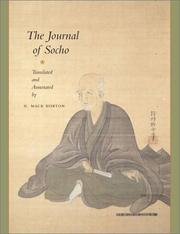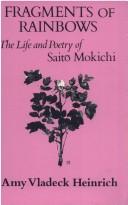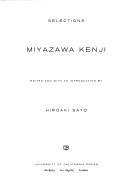| Listing 1 - 4 of 4 |
Sort by
|

ISBN: 0804780242 0585457867 0804732833 9780804732833 0804735069 9780804735063 9780585457864 9780804780247 Year: 2002 Publisher: Stanford, Calif. Stanford University Press
Abstract | Keywords | Export | Availability | Bookmark
 Loading...
Loading...Choose an application
- Reference Manager
- EndNote
- RefWorks (Direct export to RefWorks)
The Journal of Socho is one of the most individual self-portraits in the literary history of medieval Japan. Its author, Saiokuken Socho (1448-1532)—the preeminent linked-verse (renga) poet of his time—was an eyewitness to Japan's violent transition from the medieval to the early modern age. Written between 1522 and 1527, during the Age of the Country at War (Sengoku jidai), his journal provides a vivid portrayal of cultural life in the capital and in the provinces, together with descriptions of battles and great warrior families, the dangers of travel through war-torn countryside, and the plight of the poor. The journal records four of Socho's journeys between Kyoto and Suruga Province, where he served as the poet laureate of the Imagawa house, as well as several shorter excursions and periods of rest at various hermitages. The diverse upbringing of its author—a companion of nobles and warlords, a student of the orthodox poetic neoclassicism of the renga master Sogi, and a devotee of the iconoclastic Zen prelate Ikkyu—afforded him rich insights into the cultural life of the period. The Journal of Socho is remarkable for its breadth and freshness of observation, whether of the activities of literary men and the affairs of great courtiers and daimyo or of the daily lives of local warriors and commoners. This variety of cultural detail is matched by the journal's wealth of prose genres: travel diary, eremitic writing, historical chronicle, conversation, and correspondence. In addition, Socho has given us more than 600 verses that together illustrate most of the principal poetic genres of the time: renga, waka, choka, wakan renku, and comic or unorthodox haikai verses.
Poets, Japanese --- Japanese poets --- Sōchō, --- Saiokuken Sōchō, --- Saiokuken, --- Shimada, Sōchō, --- 宗長, --- Socho,
Book
ISBN: 1501761188 150176117X 1501761196 Year: 2022 Publisher: Ithaca : Cornell University Press,
Abstract | Keywords | Export | Availability | Bookmark
 Loading...
Loading...Choose an application
- Reference Manager
- EndNote
- RefWorks (Direct export to RefWorks)
Mehl analyses the complex response of Meiji-era Japanese poets and readers to the challenge introduced by European verse and the resulting crisis in Japanese poetry. Amidst fierce competition for literary prestige on the national and international stage, poets and critics at the time recognised that the character of Japanese poetic culture was undergoing a fundamental transformation, and the stakes were high: the future of modern Japanese verse. Mehl documents the creation of new Japanese poetic forms, tracing the first invention of Japanese free verse and its subsequent disappearance. He examines the impact of the acclaimed and reviled shintaishi, a new poetic form invented for translating European-language verse and eventually supplanted by the reintroduction of free verse as a Western import.
Japanese poetry --- Japanese literature --- Translating and interpreting --- History and criticism. --- Foreign influences --- History --- Meiji-era Japanese poets, shintaishi, modern Japanese free-verse poetry, nineteenth-century Japanese translations of European poetry, types of japanese poetry,.

ISBN: 0231054289 9780231054287 Year: 1983 Publisher: New York Columbia university press
Abstract | Keywords | Export | Availability | Bookmark
 Loading...
Loading...Choose an application
- Reference Manager
- EndNote
- RefWorks (Direct export to RefWorks)
Poets, Japanese --- Biography --- Sait⁻o, Mokichi, --- J5780 --- J5500.80 --- -J2284.80 --- Japanese poets --- Japan: Literature -- poetry -- modern style poetry --- Japan: Literature -- history and criticism -- Gendai (1926- ), Shōwa period, 20th century --- Japan: Genealogy and biography -- biographies -- Gendai, modern (1926- ), Shōwa, 20th century --- Saitō Mokichi, 1882-1953 --- J2284.80 --- Poets, Japanese - 20th century - Biography --- Sait⁻o, Mokichi, - 1882-1953 --- Saitō, Mokichi

ISBN: 9786612772061 0520939581 1282772066 9780520939585 9780520244702 0520244702 9780520247796 0520247795 6612772069 9781282772069 Year: 2007 Publisher: Berkeley University of California Press
Abstract | Keywords | Export | Availability | Bookmark
 Loading...
Loading...Choose an application
- Reference Manager
- EndNote
- RefWorks (Direct export to RefWorks)
The poet Miyazawa Kenji (1896-1933) was an early twentieth-century Japanese modernist who today is known worldwide for his poetry and stories as well as his devotion to Buddhism. Miyazawa Kenji: Selections collects a wide range of his poetry and provides an excellent introduction to his life and work. Miyazawa was a teacher of agriculture by profession and largely unknown as a poet until after his death. Since then his work has increasingly attracted a devoted following, especially among ecologists, Buddhists, and the literary avant-garde. This volume includes poems translated by Gary Snyder, who was the first to translate a substantial body of Miyazawa's work into English. Hiroaki Sato's own superb translations, many never before published, demonstrate his deep familiarity with Miyazawa's poetry. His remarkable introduction considers the poet's significance and suggests ways for contemporary readers to approach his work. It further places developments in Japanese poetry into a global context during the first decades of the twentieth century. In addition the book features a Foreword by the poet Geoffrey O'Brien and essays by Tanikawa Shuntaro, Yoshimasu Gozo, and Michael O'Brien.
POETRY / General. --- Miyazawa, Kenji, --- Miyāsāwa, Khēnčhi, --- Kenji, Miyazawa, --- 宮澤賢治, --- 宮沢賢治, --- 宮泽贤治, --- Criticism and interpretation. --- avant garde. --- buddhism. --- buddhist poets. --- buddhists. --- contemporary poetry. --- early 20th century. --- ecologists. --- english translation. --- global context. --- global literature. --- japanese literature. --- japanese modernism. --- japanese poetry. --- japanese poets. --- lit students. --- lit studies. --- literary criticism. --- literary critics. --- literary movements. --- miyazawa kenji. --- modern literature. --- modernism. --- modernist poetry. --- poems. --- poetry collection. --- translated poetry.
| Listing 1 - 4 of 4 |
Sort by
|

 Search
Search Feedback
Feedback About UniCat
About UniCat  Help
Help News
News